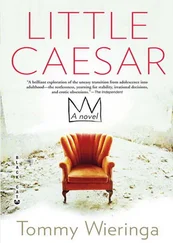When Zita came into his house she took off her shoes and replaced them with a pair of slippers she kept in the hall closet. She was as at home in his kitchen as she was in her own. She wiped down the stove and boiled water to make soup. The soup steeped as she cleaned the house, so that she and the soup were finished at the same time, a few hours later. Neither of them were in a hurry.
His uniforms hung in the closet, laundered and starched. She sewed the buttons on the waistband of his trousers (he wore suspenders and a belt, as though afraid that his pants would fall off), and every two months she put fresh mothballs on the shelves.
On the evenings when she stays over, the bottle appears on the table. The rest of the transaction takes place in a mild haze. She listens breathlessly to his stories about criminals and car chases, all of which she’s heard before. Sometimes he adds a new twist to the circumstances, the setting, or the events, making the story new again. The results amaze him, too, at times. Then they watch television until it is time to go to bed.
She withdraws to the bathroom and comes back a little later in a bright pink nightgown that reaches all the way to her ankles. She goes to the toilet and then climbs in between the sheets. He follows the same route, but much more hurriedly. She lies waiting patiently for him.
He turns off the light.
Now we hear only the rustling of sheets before the finding of positions, the brushing of bodies as they approach, the hurried reconnoitring in the dark, and the ‘Wait just a minute, Pontus.’ He feels himself becoming weighed down with desire again, a capsizing ship. Then his body is on hers, their bellies slapping together. Fumbling, he whispers: ‘What have you got on under there, woman?’
She says: ‘Ow! You’re not a dragoon, are you, Pontus?’
But he is a dragoon. A soldier returning from war, it’s been so long since he’s felt a woman’s body. He is the paramour of need, his deeds said and done in a matter of minutes.
CHAPTER TWENTY-NINE.Restless legs
The interrogation room is on the third floor. The cast-iron radiators glow. The first prisoner’s file reads ‘male, nameless, age unknown’.
The man is alone in the room. He can’t keep his legs still. His legs are still underway, while the rest of his body has come to a halt in the interrogation room. His cuffed hands are resting in his lap. The hands are calm. They’re not going anywhere anymore.
When Beg enters the room, the man keeps his legs still for a few beats, but before the commissioner has had time to reach the table the jittering has resumed.
Beg sits down. He places a folder on the table and pulls out a few sheets of paper. He spreads them out in front of him, and chooses a black ballpoint pen from his breast pocket. He has red and blue ones, too. The ballpoint slides out with a click.
‘Okay,’ he says. ‘First we need a name.’ He looks up. ‘Your name is …?’
The man looks and says nothing.
‘No name,’ Beg says. He takes a deep breath and leans forward. ‘My name is Beg,’ he says then. ‘I’m the commissioner around here.’
The man stares at a spot on the wall behind Beg. His shoulders are a clothes hanger for the jacket of his tracksuit. It’s hard to imagine what he would look like with flesh on his bones.
Beg has seen the washed-out tattoos on his body — the icons of the convict — and the tracks of the needle. That’s why he’s the first one to be interrogated. You can negotiate with junkies.
‘Okay,’ Beg says, as though picking up the thread of a momentarily interrupted conversation. The man doesn’t move. That he still has no name makes things difficult. You can use a name to flatter and to flog; it’s the start of an understanding. The game begins with a name — the negotiations. But no identification has been found on any of them.
‘We found the head,’ Beg says. ‘Which one of you was carrying it?’
Silence.
‘Was that your bag?’ He snaps his fingers. ‘Hey, do you hear me?’
The man’s eyes pull away from the wall for a moment, but are drawn back to it right away.
‘That’s where we’ve got a problem,’ Beg resumes. ‘Whatever you people were planning, I can’t judge that, but the head …’
The man says nothing, and now and again his eyes fall shut. It’s as though he hasn’t slept for years.
Beg recalls a sentence from a police academy handbook: ‘The victim is deceased when the head has been lastingly separated from the body.’
That ‘lastingly’, that was the thing. They had laughed so hard about that.
Beg scratches at a minuscule bump on the tabletop. They’ve been sitting across from each other for ten minutes already. It doesn’t bother him. If there’s one thing he’s good at, it’s remaining silent — waiting and remaining silent. He’s in no hurry.
The creature sitting across from him, Beg had learned at the academy, was thinking back over its sins. Louder and louder, the crime he had committed was echoing inside him. It looked for an opening through which to crawl out, to shout itself from the rooftops. Even if the crime had taken place in the deepest darkness, he was seeing it before him now in the clearest of light. There was nothing else he could think about anymore. You could almost see it taking place behind his eyes. His body seemed to do its utmost to drive out the crime, to be shut of the guilt; only the spirit was still resisting. But his body would betray him. It made the spirit ripe for capitulation.
Beg looks at the man across from him, and has his doubts. It seems as though the man isn’t even here, but somewhere far away.
‘Smoke?’ Beg asks.
He lights a cigarette himself and slides the pack with the lighter on top of it across the table. A junkie rarely has only one addiction.
The man reaches for the pack with both hands; but because his cuffs are chained to a ring on the table, he can barely get to it. Two fingers on his right hand are missing. He takes a cigarette from the pack and puts it between his lips. The wheel scrapes across flint, and then comes the flame, and the quiet crackling of paper and tobacco. He keeps his eyes closed as he sucks the smoke into his lungs. Pleasure has returned to his life, thanks to the man across from him. He doesn’t know it yet, but inside him gratitude and dependence have formed a reluctant alliance — he is being made ripe for a regimen of punishment and reward. He will be thankful for either; he has earned both the punishment and the reward.
The little bump on the table is a tough one. Beg can’t get it off with his fingernail.
There is no ashtray, and the cone of ash on Beg’s cigarette is growing longer and longer. He gets up and walks to the door. Holding it open with his foot, he shouts to someone out there to bring him an ashtray.
Halfway through his cigarette, the man begins coughing violently. He sounds like he’s choking.
‘Been a long time, I suppose?’ Beg asks once he’s calmed down a bit.
The man nods, his eyes filled with tears.
‘How long?’ Beg asks.
The man smiles and shrugs. Long ago.
‘A few months? Six months?’ Beg asks.
The smile fades. An expression of endless melancholy takes its place. He leans forward and puts out the cigarette in the ashtray. The question dissipates along with the smoke.
‘Where are you from? Is there someone we can inform about your being here? Wife, children, family? Isn’t there anyone who wants to know where you are?’
‘No family,’ the man says in an unsteady voice.
‘And where do you come from?’
He shakes his head. ‘The thicket … of horrors.’
‘What’s that?’
‘The poacher says … he says we have to pass through that, that then we’ll get home.’
Читать дальше











